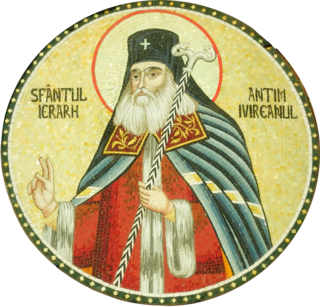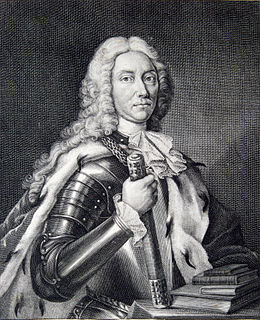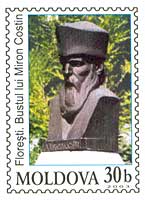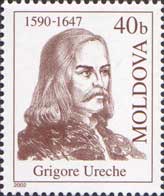 W
WAnthim the Iberian was a Georgian theologian, scholar, calligrapher, philosopher and one of the greatest ecclesiastic figures of Wallachia, led the printing press of the prince of Wallachia, and was Metropolitan of Bucharest in 1708–1715.
 W
WNeagoe Basarab V, was the Voivode (Prince) of Wallachia between 1512 and 1521. Born into the boyar family of the Craioveşti as the son of Pârvu Craiovescu or Basarab Țepeluș cel Tânăr, Neagoe Basarab, who replaced Vlad cel Tânăr after the latter rejected Craioveşti tutelage, was noted for his abilities and competence.
 W
WJohannes Caioni was a Transylvanian Franciscan friar and Roman Catholic priest, musician, folklorist, humanist, constructor and repairer of organs of Romanian origin.
 W
WConstantin Cantacuzino was a Romanian nobleman and historian who held high offices in the Principality of Wallachia. He was a humanist scholar who drew the first local map of Wallachia in 1700, and started to write a History of Wallachia which remained unfinished. In his History of Wallachia, he "accepted a Daco-Roman mixing" in connection with the origin of the Romanians. A promoter of a prudent anti-Ottoman policy, he was executed together with his son Ștefan.
 W
WDimitrie or Demetrius Cantemir, also known by other spellings, was a Moldavian soldier, statesman, and man of letters. He was twice voivode of Moldavia. During his second term, he allied his state with Russia in their war against Moldavia's Ottoman overlords; Russia's defeat forced Cantemir's family into exile and the replacement of the native voivodes by the Greek phanariots. Cantemir was also a prolific writer, variously a philosopher, historian, composer, musicologist, linguist, ethnographer, and geographer. His son Antioch, Russia's ambassador to Great Britain and France and a friend of Montesquieu and Voltaire, would go on to be known as "the father of Russian poetry".
 W
WPetru II Cercel, was a Voivode (Prince) of Wallachia from 1583 to 1585, legitimate son to Pătrașcu cel Bun and alleged half-brother of Mihai Viteazul. A polyglot and a minor figure as a poet, Petru is noted for having written his verses in Tuscan.
 W
WMiron Costin was a Moldavian (Romanian) political figure and chronicler. His main work, Letopiseţul Ţărâi Moldovei [de la Aron Vodă încoace] was meant to extend Grigore Ureche's narrative, covering events from 1594 to 1660. The Chronicles were first published in 1675.
 W
WNicolae Costin (1660–1712) was a Moldavian chronicler.
 W
WAnastasie Crimca was a Moldavian Eastern orthodox clergyman, as well as a calligrapher, illuminator, and writer.
 W
WDimitrie Barilă, better known under his monastical name Dosoftei, was a Moldavian Metropolitan, scholar, poet and translator.
 W
WIacob Heraclid, born Basilicò and also known as Iacobus Heraclides, Heraclid Despotul, or Despot Vodă, was a Greek Maltese soldier, adventurer and intellectual, who reigned as Prince of Moldavia from November 1561 to November 1563. He is remembered as a pioneer of the Protestant faith in Eastern Europe, a champion of Renaissance humanism, and a founder of academic life in Moldavia. Active within the Greek diaspora in several countries, he was a student of Hermodorus Lestarchus, and worked as a scribe alongside his cousin, Iakobos Diassorinos. Heraclid forged his genealogy several times, claiming to be a member of the Branković dynasty; he was more reliably related to the Byzantine nobility in Rhodes, and claimed the titular lordship of Samos. In the late 1540s and early '50s, he studied medicine at the University of Montpellier, and married a local. A duelist and alleged infanticide, Heraclid fled over the border with the Holy Roman Empire before he could be executed for murder. He was slowly won over by the Reformation, serving the Protestant princes of the Upper Saxon Circle.
 W
WNicholas Mavrocordatos was a Greek member of the Mavrocordatos family, Grand Dragoman to the Divan (1697), and consequently the first Phanariote Hospodar of the Danubian Principalities, Prince of Moldavia, and Prince of Wallachia. He was succeeded as Grand Dragoman (1709) by his brother John Mavrocordato (Ioan), who was for a short while hospodar in both Wallachia and Moldavia.
 W
WUdriște Năsturel, first name also Uriil, Uril, Ioriste, or Oreste, last name also Năsturelovici, was a Wallachian scholar, poet, and statesman, the brother-in-law of Prince Matei Basarab through his sister Elena Năsturel. Together, the three staged a cultural revival centered on Bucharest and Târgoviște. Năsturel had risen through the ranks of Wallachian bureaucracy and had served Radu Mihnea's government in Moldavia, being kept as Logothete by Matei Basarab. In office, he had an international correspondence and went on diplomatic travels through Central Europe, while also overseeing the printing presses. He was the titular boyar of Herăști, known in his day as Fierești and Fierăști, where he built a palace that stands as a late example of Renaissance architecture, and earned him a regional fame.
 W
WNicolaus Olahus ; 10 January 1493 – 15 January 1568) was the Archbishop of Esztergom, Primate of Hungary, and a distinguished Catholic prelate, humanist and historiographer.
 W
WNikolai Spathari, also known as Nicolae Milescu and Nicolae Milescu Spătaru, or Spătarul Milescu-Cârnu, was a Moldavian-born writer, diplomat and traveler, who lived and worked in the Tsardom of Russia. He spoke nine languages: Romanian, Russian, Latin, both Attic and Modern Greek, French, German, Turkish and Swedish. One of his grandsons was the Spătar (Chancellor) Yuri Stefanovich, who came to Russia in 1711 with Dimitrie Cantemir.
 W
WGrigore Ureche was a Moldavian chronicler who wrote on Moldavian history in his Letopisețul Țării Moldovei, covering the period from 1359 to 1594.